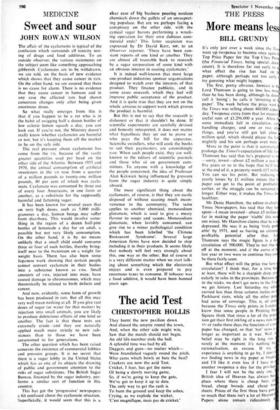MEDICINE
Sweet and sour
JOHN ROWAN WILSON
The affair of the cyclamates is typical of the confusion which surrounds all toxicity test- ing of drugs and food additives. To an outside observer, the various statements on the subject seem like something approaching gibberish. Cyclamates are to be withdrawn, we are told, on the basis of new evidence which shows that they cause cancer in rats. On the other hand, we are assured that there is no cause for alarm. There is no evidence that they cause cancer in humans and in any case the affected rats had shown cancerous changes only after being given enormous doses.
So what really emerges from this is that if you happen to be a rat who is in the habit of swigging half a dozen bottles of low calorie lemon squash a day, you can look out. If you're not, the Ministry doesn't really know whether cyclamates are harmful or not, but it's keeping them off the market to be on the safe side.
The real pressure about cyclamates has come from the us, because of the vastly greater quantities used per head on the other side of the Atlantic. Between 1955 and 1970, the annual consumption of artificial sweeteners in the us rose from a quarter of a million pounds to twenty-one million pounds, 80 per cent of which was cycla- mate. Cyclamate was consumed by three out of every four Americans, in one form or another, as a substitute for the supposedly harmful and fattening sugar.
It has been known for several years that on very high doses, such as 5,000
grammes a day, human beings may suffer from diarrhoea. This would involve some- thing in the region of a dozen half-pint bottles of lemonade a day for an adult, a possible but not very likely consumption. On the other hand, it is by no means unlikely that a small child could consume three or four of such bottles, thereby bring- itself near to the maximum on a weight for weight basis. There has also been some Japanese work showing that certain people cannot convert cyclamate in their bodies into a substance known as CHA. Small amounts of CHA, injected into mice, have caused damage to chromosomes, which may theoretically be related to birth defects and cancer.
And now, evidently, some form of growth has been produced in rats. But all this may very well mean nothing at all. If you give vast doses of sugar (or water for that matter) by injection into small animals, you are likely to produce deleterious effects of one kind or another. The fact is that these tests are extremely crude—and they are naturally applied much more strictly to new sub- stances than to those we have been accustomed to for generations.
The other question which has been raised concerns the existence of commercial lobbies and pressure groups. It is no secret that there is a sugar lobby in the United States which has as one of its objects the drawing of public and government attention to the risks of sugar substitutes. The British Sugar Bureau, financed by the sugar industry, per- forms a similar sort of function in this country.
This has got the 'progressive' newspapers a bit confused about the cyclamate situation. Superficially, it would seem that this is a
clear case of big business pouring noxious chemicals down the gullets of an unsuspect- ing populace. But are we perhaps facing a conspiracy on the other side, with the cynical sugar barons performing a wreck- ing operation for their own dubious com- mercial ends? This latter suspicion was expressed by Dr David Kerr, MP , to an Observer reporter. 'There have been con- stant reports of one kind or another. They are almost all traceable back to research by a sugar corporation of some kind with an obvious interest in ousting cyclamates.'
It is indeed well-known that most large one-product industries sponsor organisations designed to watch over the interests of that product. They finance publicity, and in some cases research, which they feel will improve public acceptance of the product. And it is quite true that they are not on the whole anxious to support work which proves the product is harmful.
But this is not to say that the research is dishonest or that it shouldn't be done. If scientific experiments are carefully devised and honestly interpreted, it does not matter what hypothesis they set out to prove or who pays the bill for the apparatus. Scientific swindlers, who will cook the books to suit their paymasters, are astonishingly rare. When such people exist, they are well- known to the editors of scientific journals and those who sit on government com- mittees. To anyone with a knowledge of the people concerned, the idea of Professor Alan Kekwick being influenced by pressure from the sugar industry is quite simply absurd.
The most significant thing about the cyclamates, of course, is that they are easily disposed of without causing much incon- venience to the community. The same applies to another chemical, monosodium glutamate, which is used to give a meaty flavour to soups and sauces. Monosodium glutamate, when lavishly consumed, can give rise to a minor pathological condition which has been labelled 'the Chinese Restaurant Syndrome'. Several large American firms have now decided to stop including it in their products. It seems likely that nobody will feel very strongly about this, one way or the other. But of course it is a very different matter when we start talk- ing about something which the electorate enjoys and is even prepared to pay enormous taxes to consume. If tobacco was a food additive, it would have been banned years ago.














































 Previous page
Previous page